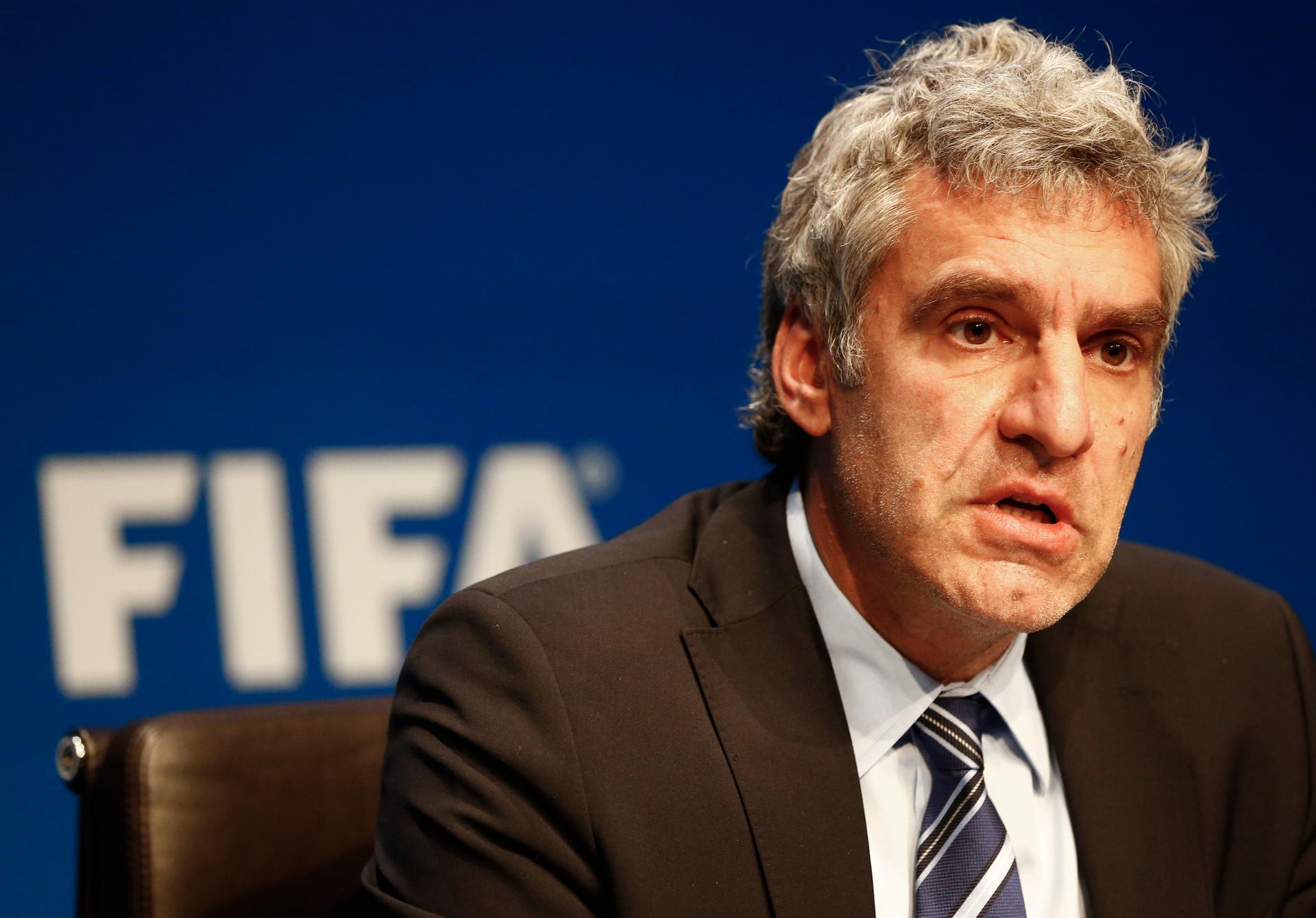FIFA's communications director, Walter De Gregorio, faces the spotlight Wednesday after indictments against and arrests of some of the soccer organization's leaders.
Soccer, they say, is the world’s game — popular in pretty much every country on the planet. Yes, even here in the United States. We’re not even going to debate that here.
And internationally, the game is run by FIFA, a.k.a. the Fédération Internationale de Football Association. That’s a leftover from the days that soccer was known as “association football.”
So to understand soccer, and the current corruption scandal sweeping the sport, you have to understand FIFA. Here are some key facts:
FIFA’s main source of power is the World Cup, soccer’s top global event organized (Olympic-style) every four years in a different host country. The last one was in Brazil last year, the next one is in Russia in 2018. Almost every country in the world has a national soccer team (a sort of national all-stars squad) that competes to get in.
But the World Cup is about more than just prestige or national bragging rights. It’s FIFA’s cash cow. According to FIFA, “approximately 90 per cent of FIFA’s revenue is generated through the sale of television, marketing, hospitality and licensing rights for the FIFA World Cup.”
And over the last four-year period, FIFA generated $5.7 billion in revenues. That’s equivalent to the GDP of the principality of Monaco, for example, and way more than that many other small nations.
The revenue stream includes $2.4 billion from the sale of TV rights to tournaments, and $1.6 billion for marketing rights paid by major World Cup sponsors like Coca-Cola, VISA, Budweiser and Hyundai.
So what does FIFA do with $5.7 billion in revenues? FIFA claims that more than 70 percent of its expenditures go straight back into “football development.” It’s a term that includes many things.
There are expenses to prepare for the next World Cup, rewards to teams that qualify for the tournament, and cash payments to soccer organizations all over the globe. That money is supposed to pay for the actual development of the sport around the world, through new fields, equipment and uniforms for players at the grassroots level.
So where does the corruption come in? Well, it seems to come in at every level.
"If you have a look at FIFA's accounts, you do not know where all the money went,'' says Deborah Unger of Transparency International's Corruption in Sport Initiative. "You don't know how much the senior executives get. They're very very lump-sum broad accounts."
FIFA executives are accused of taking millions of dollars in bribes to influence everything from who gets to host the next World Cup to which TV networks can fund the game. Those kind of under the table deals are at the heart of the US Justice Department’s case against several top FIFA officials.
FIFA actually commissioned a former US attorney, Michael Garcia, to investigate corruption within its ranks. But it refused to publish Garcia’s full final report while claiming the investigation had yes uncovered a few bad apples but cleared the organization as a whole. Garcia disputed that conclusion.
Also, FIFA’s president Sepp Blatter, who has not been indicted, has long been dogged by allegations that he uses those “football development” funds as a slush fund, distributing money to soccer officials in each of FIFA's 209 member nations in exchange for their votes during FIFA presidential elections.
RELATED: Who is Sepp Blatter and why doesn't he just quit — or get forced out?
Blatter has already served four terms as FIFA president, for a total of 16 years at the helm, and is poised to win yet another election this week. Despite the allegations swirling around them, the arrest of several top FIFA officials and now calls to resign from John McCain and Europe's soccer federation, Blatter and his posse still claim it’s business as usual at FIFA headquarters in Zurich.
Transparency International's Unger says Blatter doesn't deserve extra time. "I think someone when they've run an organization for 17 years which is being accused of having institutionalized corruption — is what I think the Department of Justice said — should take responsibility."
But the pressure is mounting for anyone involved with soccer’s world body to do something, anything to clean up FIFA’s act.
Swiss authorities had resisted launching a probe into allegations of corruption in the process by which FIFA selected Russia and Qatar as the hosts for the next two World Cups in 2018 and 2022. Now they’ve finally done so.
And those big multinational sponsors that help line FIFA’s nest? They’re finally speaking out about the horrible conditions that migrant workers in Qatar are having to endure as they build the facilities for the 2022 tournament.
Hundreds of workers have already died as Qatar prepares for FIFA’s showcase in seven years. And the sponsors have said they’re increasingly disturbed by that. After this week’s arrests in Zurich, how much longer until those sponsors no longer want to play ball with FIFA?
Joyce Hackel of PRI's The World contributed to this report.
UPDATE: A very harsh statement from one of the top World Cup sponsors, VISA.
Every day, reporters and producers at The World are hard at work bringing you human-centered news from across the globe. But we can’t do it without you. We need your support to ensure we can continue this work for another year.
Make a gift today, and you’ll help us unlock a matching gift of $67,000!
